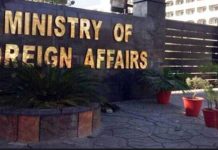ISLAMABAD, MAY 28 /DNA/ – As part of the commemoration of Youm-e-Takbeer, the Arms Control and Disarmament Centre (ACDC) at the Institute of Strategic Studies Islamabad (ISSI) hosted a seminar titled “The Future of Deterrence and Emerging Challenges” Lt. General (R) Khalid Ahmed Kidwai, NI(M), HI, HI(M), Advisor National Command Authority (NCA), and former DG SPD, was the chief guest. Distinguished speakers included: Amb. Zamir Akram, Advisor SPD; Air Commodore (R) Khalid Banuri, Senior Advisor Training Rejuvenation and Jinnah Centre for Character and Leadership (JCCL), AHQ Islamabad; and Dr. Salma Malik, Associate Professor, Department of Defence and Strategic Studies, QAU.
In his keynote address, Lt. General (R) Khalid Ahmed Kidwai underscored the emergence of a “new normal” in South Asia’s strategic environment following the recent intense escalation-cum-retaliation mini war between India and Pakistan. He highlighted that the four-day conflict, lasting only 87 hours, was a profound test of both conventional and nuclear deterrence, as well as the integration of modern technologies in warfare. While commemorating the 27th anniversary of Pakistan’s nuclear tests, Lt. Gen. Kidwai reaffirmed that Pakistan’s nuclear capability remains the cornerstone of its national security, ensuring strategic stability and restoring balance in South Asia. He emphasized that the defining feature of the new strategic reality is the reversal of air superiority in the region. The Pakistan Air Force’s (PAF) decisive performance, leveraging advanced Chinese-technology and using integrated multi-domain tactics, has established Pakistan as the dominant air power in South Asia. This shift validates Pakistan’s conventional deterrence as an effective complement to its robust nuclear arsenal. He outlined the key tenets of the ‘new normal’: Air superiority has shifted decisively to Pakistan, with the Pakistan Air Force now the dominant air power in South Asia; Pakistan’s battle-tested conventional deterrent, especially its Air Force, has assumed a leading role in regional deterrence; Pakistan’s credible nuclear deterrence will continue to constrain and limit India’s political and operational choices, thereby maintaining strategic stability; any Indian aggression will be met with a ‘notch-up response’ as Field Marshal Asim Munir has promised, a ‘Quid Pro Quo Plus’, as Pakistan’s retaliation will always be a calibrated and escalated response; India’s pattern of seeking ceasefires following Pakistan’s intense retaliation has become an established norm; and international diplomatic interventions will persist in managing crises to prevent escalation beyond defined limits. Additionally, Pakistan reserves the right to reciprocate any terror attack with conventional responses against pre-determined adversaries, reflecting a reciprocal logic to India’s declared doctrines. He further outlined that Pakistan’s nuclear weapons program had continued to serve as a robust deterrent and the guarantor of peace and stability in South Asia. Over the last six years, India’s Hindutva-driven BJP government had twice tested nuclear-armed Pakistan’s political will, strategic resolve, and military capability first by striking mainland Pakistan in February 2019, and again in Azad Kashmir in May 2025. On both occasions, India emerged second best. These confrontations reaffirmed the credibility of Pakistan’s deterrent posture both conventional and nuclear and demonstrated that any Indian aggression would be met with a stronger-than-proportional response. He concluded by stressing Pakistan’s steadfast resolve to safeguard its sovereignty and regional peace in an environment shaped by emerging threats and technological advancements, marking a strategic shift that firmly favors Pakistan’s security interests in South Asia. He also underlined that India and Pakistan should seize the opening provided by President Trump’s diplomatic initiative by taking the path of dialogue and addressing the conflicts plaguing South Asia.
In his remarks DG ISSI Ambassador Sohail Mahmood emphasized the enduring significance of Youm-e-Takbeer as a landmark in South Asia’s strategic history. He recalled Pakistan’s decisive response to India’s nuclear provocations in 1998, which reestablished deterrence and restored strategic balance in the region. He noted that Pakistan’s nuclear journey was not a choice but a necessity driven by existential security imperatives. He highlighted Pakistan’s responsible conduct as a nuclear state over the past 27 years, and stressed five key elements of national policy: a credible and operationalized deterrent; an impeccable nuclear safety and security regime; a growing record of peaceful nuclear applications; responsible international conduct; and consistent nuclear diplomacy to combat discrimination and misperception. He cautioned that the regional security environment is increasingly volatile due to disruptive technologies, and India’s destabilizing posture, including MIRVs, sea-based deterrents, and counterforce strategies. He also reffered to India’s post-Pahalgam misadventure, and lauded Pakistan’s calibrated response, while warning about New Delhi’s strategic recklessness, driven by Hindutva ideology and electoral calculation. He reaffirmed that Pakistan’s Full Spectrum Deterrence under Credible Minimum Deterrence ensures that no space exists for aggression below the nuclear threshold. He concluded by reiterating that deterrence is not about fear it is about stability, responsibility, and peace through strength and emphasized that Pakistan remains fully committed to its strategic posture, with clarity, restraint, and resolve to safeguard its sovereignty and regional stability.
Earlier, in his introductory remarks, Malik Qasim Mustafa, Director ACDC ISSI, welcomed the participants and emphasized the significance of Youm-e-Takbeer in safeguarding Pakistan’s sovereignty and restoring strategic balance in South Asia. He noted that India’s shift towards warfighting doctrines, rapid missile modernization, and pursuit of disruptive technologies such as hypersonics, AI, and space weaponization pose grave challenges to deterrence stability. He reaffirmed Pakistan’s commitment to responsible deterrence, strategic restraint, and the pursuit of regional peace.
Amb. Zamir Akram discussed “Emerging Challenges and Regional Deterrence,” emphasizing the transformation of South Asia’s strategic landscape post-nuclearization. He highlighted India’s increasingly aggressive posture, including false flag operations and hybrid warfare tactics involving proxies like the BLA. He analyzed Pakistan’s calibrated and robust military response, particularly following India’s 2025 misadventure, which resulted in the downing of several Indian aircraft and exposed the vulnerability of its advanced air defence systems. He emphasized that while nuclear deterrence prevents full-scale war, India’s coercive strategies continue to undermine strategic stability in the region. He concluded that India’s strategic autonomy has weakened, while Pakistan’s resilience and strategic partnership with China remain critical for regional stability.
Air Commodore Khalid Banuri delivered an insightful discussion on “Emerging Technologies and the Changing Nature of Warfare.” He examined the evolving role of Artificial Intelligence, cyber and electronic warfare, hypersonic systems, and space-based capabilities, highlighting their implications for speed, precision, and asymmetry in conflict. He emphasized the ethical, regulatory, and strategic challenges posed by these technologies, including the credibility gap and cognitive influence operations. Stressing the need for adaptation, innovation, and preparedness, he concluded that change remains the only constant in warfare, and future militaries must remain agile across both kinetic and non-kinetic domains.
Dr. Salma Malik presented an in-depth analysis on “The Shifting Sands of Global Deterrence: Technological Race and Strategic Stability,” examining how advancements in Artificial Intelligence, hypersonic missile systems and emerging military technologies are transforming global deterrence dynamics. She underscored the blurred boundaries between kinetic and non-kinetic warfare, emphasizing India’s strategic shift post-2019 and its irresponsible posturing. She highlighted Pakistan’s measured restraint, and argued for proactive diplomatic engagement, particularly on Kashmir and regional stability. She also called for advocating multilateral dialogue and strategic lawfare to counter escalating asymmetries and normative erosion.
The seminar concluded with a comprehensive Q&A session and Chairman BOG Ambassador Khalid Mahmood distributed souvenirs to the Chief Guest.

















